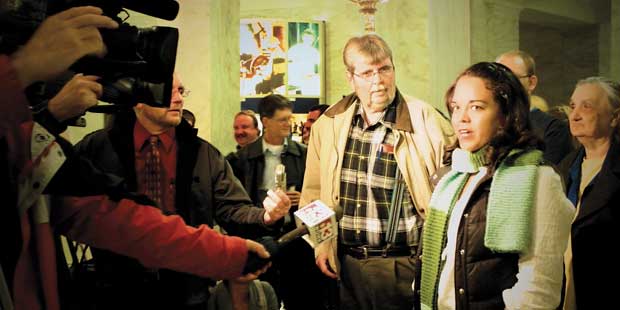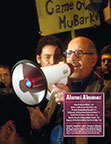Charity Begins at Home
Printer Friendly VersionAs environmental policy coordinator for WE ACT for Environmental Justice in Harlem—her first job after graduation—Stephanie Tyree ’08 watched from afar as residents in her home state of West Virginia strapped themselves to dump trucks or formed human chains with their linked hands encased in hardened cement to protest coal mining that they believed destroyed mountains, polluted water sources, and created hazardous living conditions. “People were standing up in a way that I’d never seen before, drawing the line and saying, ‘We’re not going to take this anymore,’” Tyree says.
In August 2009, Tyree traded her Bedford-Stuyvesant apartment for a house in the foothills of the Appalachian Mountains. And she has joined activists and residents in protesting detrimental coal mining practices as the environmental justice coordinator at the Ohio Valley Environmental Coalition (OVEC), a West Virginia–based grassroots advocacy organization.
Tyree’s work is divided between fighting mountaintop removal, in which explosives are used to blast off as much as 500 feet from the top of a mountain to expose its coal seam, and coordinating the Sludge Safety Project, which educates the community about the potential hazards of slurry or sludge—the wastewater that results from washing coal. The coal industry “will tell you up and down that slurry is safe, that it doesn’t travel into people’s groundwater,” Tyree says. But when some people turn on the tap, she asserts, their water “comes out black with lumps of coal.”
The only employee at OVEC to hold a law degree, she helps residents file lawsuits and deal with permits, assists in drafting proposed legislation, and educates community members about their rights. Making house calls to taste residents’ water and hear their complaints, Tyree “never uses a notepad,” says resident Maria Lambert. “She just listens and has a way of leading people into conversation so that they can figure solutions out on their own.”
Because of Tyree’s persistence, politicians were moved to invite West Virginia coal industry leaders and local residents to a meeting about a bill she helped draft that proposed alternative means of processing coal. In the end, the state legislature defeated the bill. “But as a result of that meeting,” says Dianne Bady, co-director of OVEC, “we’ve educated the legislature and gotten a lot more publicity, so in the future we may likely get the bill passed.”
Tyree and coal industry leaders generally don’t see eye to eye. Jason Bostic, vice president of the West Virginia Coal Association, says there are certain issues on which he and Tyree “respectfully agree to disagree.” He insists that the only chemicals found in coal slurry are minerals that occur naturally in West Virginia’s soil. And he asserts that the industry is highly regulated, its mines frequently inspected. But he calms down when talking about Tyree. “We fight like cats and dogs on a particular issue but can walk out of the state capitol and have a decent, tame, civilized conversation,” he says. “Stephanie is a class act.”
During the meeting about the draft bill, Bostic admits that he lost his temper at Tyree. But Tyree remained on point and did not back down. “She handled it gracefully without giving an inch of ground,” says Mat Louis-Rosenberg, an activist with Coal River Mountain Watch in West Virginia, who was also in attendance. “After the session, he apologized.”
—


 Multimedia
Multimedia